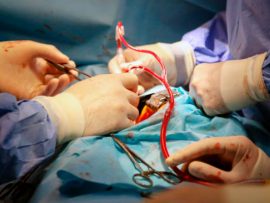Abstract Objectives Age is the main determinant for mortality in patients requiring postcardiotomy extracorporeal membrane oxygenation (PC-ECMO), but strategies to reverse this trend are unknown. This study investigates PC-ECMO outcomes..
Read MoreAbstract Background Extracorporeal membrane oxygenation (ECMO) is increasingly used in patients after cardiac surgery; however, anticoagulation management has consistently been challenging. This study aimed to explore the feasibility of a..
Read MoreAbstract Background Outcomes in cardiac surgery are influenced by surgical priority, with higher mortality in emergency cases. Whether this applies to postcardiotomy venoarterial (VA) extracorporeal membrane oxygenation (ECMO) remains unknown...
Read MoreAbstract Background Children who undergo cardiac surgery may require postcardiotomy extracorporeal membrane oxygenation (ECMO). Although morbidities are considerable, our understanding of outcome determinants is limited. We evaluated associations between patient..
Read MoreAbstract Objectives Although cardiogenic shock requiring extracorporeal life support after cardiac surgery is associated with high mortality, the impact of sex on outcomes of postcardiotomy extracorporeal life support remains unclear..
Read MoreAbstract Objectives: Most post-cardiotomy (PC) extracorporeal membrane oxygenation (ECMO) runs last less than 7 days. Studies on the outcomes of longer runs have provided conflicting results. This study investigates patient..
Read MoreAbstract Objective There is a paucity of sex-specific data on patients’ postcardiotomy venoarterial extracorporeal membrane oxygenation (VA-ECMO). The present study sought to assess this issue in a multicenter study. Design..
Read MoreAbstract Objectives To compare the outcomes of patients with postcardiotomy shock treated with venoarterial (VA-ECMO) only compared with VA-ECMO and intra-aortic balloon pump (IABP). Design A retrospective multicenter registry study. Setting..
Read MoreAbstract Postcardiotomy cardiogenic shock (PCCS) is a rare but catastrophic syndrome that can occur following separation from cardiopulmonary bypass or at any time during the immediate postoperative course. The management..
Read MoreBackground Post-cardiotomy cardiogenic shock (PCCS) has an incidence of 2–6 % after routine adult cardiac surgery. 0.5–1.5 % are refractory to inotropic and intra-aortic balloon pump (IABP) support. Advanced mechanical circulatory support..
Read MoreBackground Postcardiotomy cardiogenic shock (PCCS) refractory to inotropic support and intra-aortic balloon pump (IABP) occurs rarely but is almost universally fatal without mechanical circulatory support. In this systematic review and..
Read More








